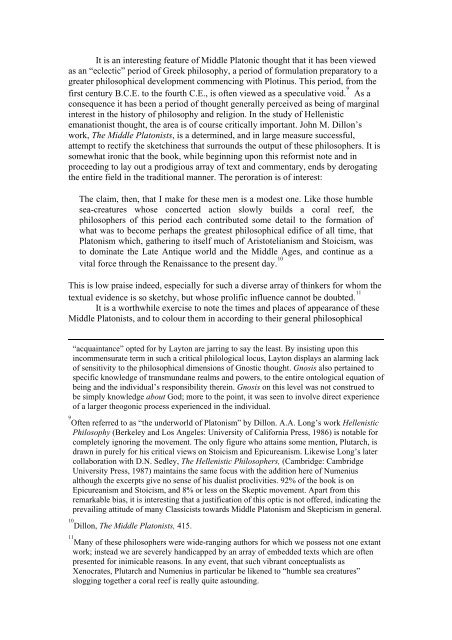THE EGYPTIAN FOUNDATIONS OF GNOSTIC THOUGHT
THE EGYPTIAN FOUNDATIONS OF GNOSTIC THOUGHT
THE EGYPTIAN FOUNDATIONS OF GNOSTIC THOUGHT
You also want an ePaper? Increase the reach of your titles
YUMPU automatically turns print PDFs into web optimized ePapers that Google loves.
It is an interesting feature of Middle Platonic thought that it has been viewed<br />
as an “eclectic” period of Greek philosophy, a period of formulation preparatory to a<br />
greater philosophical development commencing with Plotinus. This period, from the<br />
first century B.C.E. to the fourth C.E., is often viewed as a speculative void. 9<br />
As a<br />
consequence it has been a period of thought generally perceived as being of marginal<br />
interest in the history of philosophy and religion. In the study of Hellenistic<br />
emanationist thought, the area is of course critically important. John M. Dillon’s<br />
work, The Middle Platonists, is a determined, and in large measure successful,<br />
attempt to rectify the sketchiness that surrounds the output of these philosophers. It is<br />
somewhat ironic that the book, while beginning upon this reformist note and in<br />
proceeding to lay out a prodigious array of text and commentary, ends by derogating<br />
the entire field in the traditional manner. The peroration is of interest:<br />
The claim, then, that I make for these men is a modest one. Like those humble<br />
sea-creatures whose concerted action slowly builds a coral reef, the<br />
philosophers of this period each contributed some detail to the formation of<br />
what was to become perhaps the greatest philosophical edifice of all time, that<br />
Platonism which, gathering to itself much of Aristotelianism and Stoicism, was<br />
to dominate the Late Antique world and the Middle Ages, and continue as a<br />
vital force through the Renaissance to the present day. 10<br />
This is low praise indeed, especially for such a diverse array of thinkers for whom the<br />
textual evidence is so sketchy, but whose prolific influence cannot be doubted. 11<br />
It is a worthwhile exercise to note the times and places of appearance of these<br />
Middle Platonists, and to colour them in according to their general philosophical<br />
“acquaintance” opted for by Layton are jarring to say the least. By insisting upon this<br />
incommensurate term in such a critical philological locus, Layton displays an alarming lack<br />
of sensitivity to the philosophical dimensions of Gnostic thought. Gnosis also pertained to<br />
specific knowledge of transmundane realms and powers, to the entire ontological equation of<br />
being and the individual’s responsibility therein. Gnosis on this level was not construed to<br />
be simply knowledge about God; more to the point, it was seen to involve direct experience<br />
of a larger theogonic process experienced in the individual.<br />
9<br />
Often referred to as “the underworld of Platonism” by Dillon. A.A. Long’s work Hellenistic<br />
Philosophy (Berkeley and Los Angeles: University of California Press, 1986) is notable for<br />
completely ignoring the movement. The only figure who attains some mention, Plutarch, is<br />
drawn in purely for his critical views on Stoicism and Epicureanism. Likewise Long’s later<br />
collaboration with D.N. Sedley, The Hellenistic Philosophers, (Cambridge: Cambridge<br />
University Press, 1987) maintains the same focus with the addition here of Numenius<br />
although the excerpts give no sense of his dualist proclivities. 92% of the book is on<br />
Epicureanism and Stoicism, and 8% or less on the Skeptic movement. Apart from this<br />
remarkable bias, it is interesting that a justification of this optic is not offered, indicating the<br />
prevailing attitude of many Classicists towards Middle Platonism and Skepticism in general.<br />
10<br />
Dillon, The Middle Platonists, 415.<br />
11<br />
Many of these philosophers were wide-ranging authors for which we possess not one extant<br />
work; instead we are severely handicapped by an array of embedded texts which are often<br />
presented for inimicable reasons. In any event, that such vibrant conceptualists as<br />
Xenocrates, Plutarch and Numenius in particular be likened to “humble sea creatures”<br />
slogging together a coral reef is really quite astounding.










